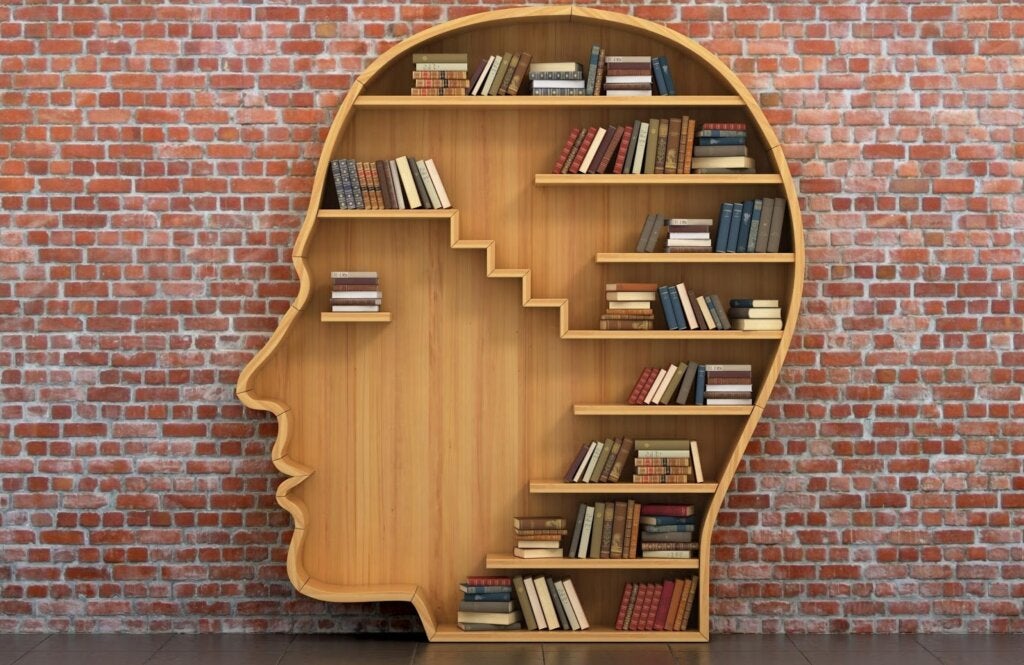Cervantes claimed that “There is no book so bad… that it does not have something good in it”. Along those lines, this would mean that even bad literature about wellness might generate some interest. However, it wouldn’t necessarily mean that they’re good books. So, is it possible to know how to recognize a good self-help book?
In this article, we reflect on self-help books, that, as their name suggests, are intended for us to help ourselves with certain tools, exercises, and reflections. They’re usually written by mental health professionals.
That said, in this most sensitive of areas, it’s certainly not the case that anything goes. Therefore, what makes a good self-help book? What criteria should we take into account when choosing one? These are important questions, as there are some books that can do more harm than good.
“Remember, a book is always a gift.”
-Sheridan Hay-
Tips to help you find a good self-help book
In this article, we give you some tips to choose good quality books with a minimum of professional rigor. In other words, those that can really help you. We’ll look at all the aspects that a self-help book should include. We’ll also consider things that shouldn’t appear in them, such as those that are full of empty phrases or those that include toxic positivity.
As a starting point, when it comes to recognizing a good self-help book, you must take into account the following considerations:
- Who wrote it? It should be a mental health professional accredited in the psychological field. For example, a psychologist or psychiatrist.
- What’s in the book? It should be based on current scientific evidence (studies), and not solely on the author’s opinions or beliefs.
- What does the author assure that they’ll provide? Avoid impossible and absurd promises like “Recover your mental health in just one month.”
- How is it written? It’s not only the content that matters. The quality of the writing also makes a good book (and says a lot about its author/publisher).
Now let’s take a closer look at these and other aspects.
1. Start at the beginning and look at the table of contents
When it comes to choosing a good self-help book, you must look at what it includes. So to start with, open the book and look at the table of contents. Do you think that the different chapters are a good reflection of what the title of the book suggests it wants to convey?
Do the chapters seem to cover everything the title suggests? Ideally, the content related to the central theme of the book should appear in the table of contents. Therefore, check if the theme is maintained or if it only dedicates a couple of sections to it and then deviates into other topics that may not be useful to you.
“Good books, like good friends, are few and chosen, the more select, the more enjoyable.”
-Amos Bronson Alcott-
2. Look at the title
Although the title isn’t everything, it’s still important. Avoid choosing books that simplify or trivialize real mental health issues with platitudes, catchphrases, or just ‘great-sounding’ phrases.
Above all, avoid those that sell you impossible messages or who try to make predictions about your happiness. For example, “Be happy in a week”, or “Say goodbye to depression with these two simple exercises” etc.
3. Avoid toxic positivity
Avoid these types of messages at all costs, whether they’re in the title or in the text. Remember, improving your mental health isn’t a simple task that can be achieved by merely thinking positive thoughts. In fact, there’s always a great deal of work behind it.
4. Avoid self-help books that promise the earth
When it comes to sourcing good self-help books, you should also consider those you must avoid. For instance, if you start leafing through the book and see that the author is promising the earth and claims to be able to help you no matter what, be wary.
Keep in mind that a good self-help book should offer you solid content that allows you to find the tools you need to feel better.
In other words, it must be able to motivate you without offering you false hope. When it comes to finding good self-help books, run away from those that promise quick and easy solutions to all your emotional problems.
5. The author must be an accredited professional
Since we’re talking about self-help, ideally, the book should be written by a mental health professional. In other words, a psychiatrist, psychologist, or psychotherapist.
We should also mention the books written by people who provide interesting testimonies due to the fact that they’ve had lives in which they’ve had to overcome many obstacles. However, these aren’t really self-help books as such.
We know that, in the current market, there are a large number of self-help books by the most varied authors, but be careful and make sure that whoever has written it is a specialist in their field and not someone who’s only done a short course in coaching or similar.
6. Who’s the editor?
We also encourage you to look at the publisher. Are they specialists in the subject?
Do they have experience in this sector? Do they have a certain reputation? Are they scientific publishers? We recommend you ask yourself these questions and work from there.
7. Look at the quality of the writing
The book must be written in clear and understandable language because it’s an informative book, not a technical one. It probably will contain some technicalities, but these should be explained in the book.
Remember that for a self-help book to be ‘good’, it shouldn’t only contain useful messages, but they must be well written and easily understood by the reader.

Spotting good self-help books: what are they for?
Finally, and by way of reflection, when it comes to sourcing good self-help books, it’s important that you’re clear about their function. Therefore, you must bear in mind that books of this type are never a substitute for a psychotherapeutic process guided by a licensed mental health professional.
Above all, if you suffer from a mental disorder, it’s always best to go to a clinical psychologist or a psychiatrist if you need pharmacological treatment. While self-help books can complement the process, and even enrich it, they can never replace it.
On the other hand, a self-help book does offer the possibility of:
- Identifying what’s happening to you and understanding yourself better (through psychoeducation ).
- Getting to know yourself better.
- Identifying your strengths.
- Acquiring various tools and resources to enhance your well-being.
- Learning about psychology in an interesting and entertaining way.
“You are not what you are because of what you write, but because of what you have read”.
-Jorge Luis Borges-
The post Self-Help Books: How to Choose a Good One appeared first on Exploring your mind.



















Comments